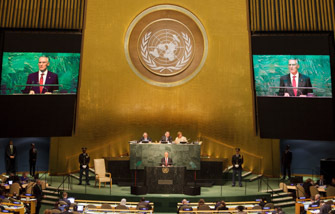
My first words are to greet Gonçalo M. Tavares, author of the prize winning book, to whom I address my most sincere congratulations.
In a normal situation, it would maybe not be necessary to add what this prize means. In this instance, however, the book received such an enormous acceptance, that the prizes awarded it followed one after another. One had not yet been attributed when the next one was announced. It should thus be added that, since it is Gonçalo M. Tavares we are referring to, the prize that is being attributed today is the Grand Prize for Romance and Novel from the Portuguese Authors’ Association, which happens to be the oldest prize attributed in Portugal for creative literary works.
I won’t go much further in my praise of the prize winner. After all that has been stated here, after so many translations, so many national and international prizes, and so much applause from the most demanding critics, it is difficult not to become redundant when commenting on this author’s work: work that, in just a decade, and due only to personal merit, brought Gonçalo M. Tavares to the head of the indisputable names in the panorama of contemporary literature.
What we have been witnessing, with each new edition is, in effect, such a wide consensus, expressed in so many ways and by so many highly qualified representatives, not just from the academia but also public opinion and the media, that surely its significance is not just a transient episode.
As far as I’m concerned, I would just wish to express my great satisfaction that all of us, Portuguese, feel when witnessing the success and the justified projection reached by one of our authors.
Satisfaction and recognition. The prestige reached outside our borders by an author, an artist or a scientist is always an added value for our common heritage. Each of his readers, each prize he receives, is reflected in the global image of the Country and increases the regard and interest for everything Portuguese.
The merit and the laurels are very obviously only his own. It is in his talent, in his imagination, in his creative strength and in his work that resides the secret of all the successes he has attained until now.
There is anyway no other explanation for this prodigy, which is to be read and enjoyed in the four corners of the world, by readers with completely distinct cultures and ways of life.
But in some way or another we all collectively benefit, when a work of this kind is internationally recognized.
Because it is also in the language of Camões and Fernando Pessoa, of Vieira and Eça de Queiroz, in the language with which we speak every day, the language in which Gonçalo M. Tavares writes books that are later translated.
Through his novels and his poetry, his tales and his plays, the Portuguese language has become richer and, through it, universal culture has also become enriched, with new ways of seeing, imagining and feeling.
Works such as those by Gonçalo M. Tavares truly confer on Portuguese the status of a live language. It is not just the fact that this language is spoken and written by many millions of men and women. Above all, it is the fact that language is a dynamic space, within which universal culture and science also become transformed and renewed, in a permanent dialogue between peoples and between generations.
A journey to India, the book that brought us here today, is the instance of that web of different perspectives and memories, through which art can reach new horizons and accomplish, in fiction, what the poet said of the Portuguese discoveries: «give new worlds to the world».
This is a book with a title that reverts to our history, and its make up reminds us of the epic poem Lusíadas.
Apart from this it is enough to meander through the pages for Camões and other travelling writers come to mind, such as Fernão Mendes Pinto and João de Barros, whose works picture the collision between differing worlds and civilizations.
However, and without demeaning these easily identifiable origins, A journey to India is above all a modern and universal text, where complexity and uncertainty are reflected, and are undoubtedly the markings of our world and of the time we are living.
There are thus excellent reasons to congratulate ourselves with its publication and to heartily congratulate the author, Gonçalo M. Tavares, who the Portuguese Authors’ association wished to distinguish this year.
I am certain that other works of his will join this one and will be garnered with the same success.
Thank you very much.
© 2006-2016 Presidency of the Portuguese Republic
You have gained access to the records of the Official Site of the Presidency of the Republic from 9 March 2006 to 9 March 2016.
The contents available here were entered in the site during the 10 year period covering the two mandates of President of the Republic Aníbal Cavaco Silva.